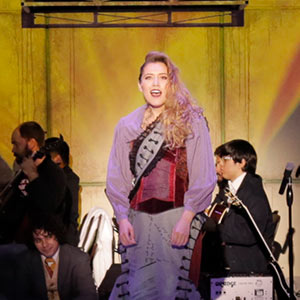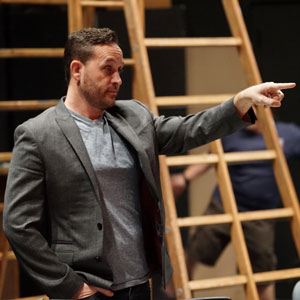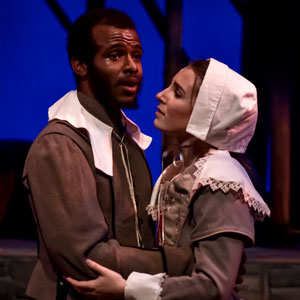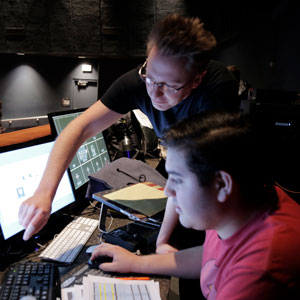racers' explores trauma suffered by Vietnam Vets
— Fullerton College Hornet - Dawn Streit - Friday, May 12th, 1989
The play Tracers, currently being performed by the FC Theater Department, can be described as a dramatized documentary of one American platoon's actual experiences in the Vietnam War and, in the words of the play's conceiver, himself a Vietnam Vet, "what it felt like for them to return home." The lighting, music, sound effects along with strong character portrayals by several of the actors engages and holds the audiences' attention from beginning to end.
Music plays a predominant role in distinguishing time periods of the play as scenes fluctuate from the 1980's to just after the war and during the war.
Lighting designer Steven Wolff Craig and sound designer Wendy Brueder combined their skills to produce some excellent lazarium-type effects, especially during the intense jungle and drug scenes in Vietnam.
Craig and Brueder are also to be credited as respective Technical Director and Assistant Director.
The play opens to nostalgic folk and rock music of the 60's era. The lights dim and fade to black and music is replaced by the sound of an approaching helicopter, that grows increasingly louder until you can easily imagine a chopper landing on the black stage and can almost feel the breeze from the moving propellers.
The combat scenes are made frighteningly realistic by the use of a soundtrack of gunfire as the soldiers blast their M-16 rifles at the audience.
Against a simple black backdrop and an almost bare stage, the skillful use of blue and yellow lights by light-board operator Kelly Collins distinguishes different times of day and enhances the play's various moods.
If the actors of Tracers were left to perform without the added intensity of these effects, the play would still have been a success, however.
Nicholas Boicourt Jr., as Dinky Dau, gives a strong performance as a young and inexperienced GI who returns home in a wheelchair, angry at society and cynical of American women.
Portraying a complex and emotional character, Boicourt proves himself to be a diverse actor, capable of commanding a variety of emotional scenes. Especially powerful is his display of rage during the body count scene where the platoon is assigned to collect dead American GI's.
Professor, played by Daniel Michelson, is a classic, 60's hippie-intellectual who reads Hermann Hesse between patrols. But he also possesses a strong survival instinct and eventually becomes "like a robot" in order to kill the Vietcong.
His monologues move the audience with the open display of the characters' sensitivity, yet with a keen understanding of his character and his situation, Michelson omits unnecessary sentimentality.
Randy Stripling's performance as the tough Sergeant Williams was more sarcastic than tough at times, but was, nevertheless, convincing, especially during a moving speech to the audience.
Given only nine weeks to turn civilians into fighters, he explains that he must seek out and come down heavy on the one percent of men who are warriors. "Ten percent are fighters. One in one hundred is a warrior. Eighty percent are targets," explains Sergeant Williams in this speech.
In 1984, Tracers won the Joseph Jefferson Award for best ensemble performance. Tracers won two more awards in 1985: John Difusco was given the Drama Desk Award for sound and music design and original actor Richard Chaves received the Theatre World Award for outstanding new talent.
The FC production of Tracers can be seen at 8 p.m. every night through May 13, with a final matinee performance at 2 p.m. on Sunday, May 14.








